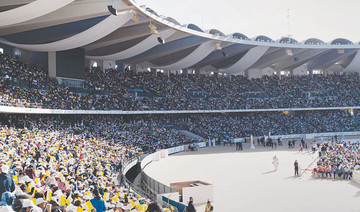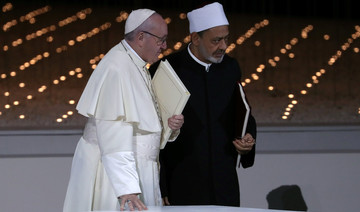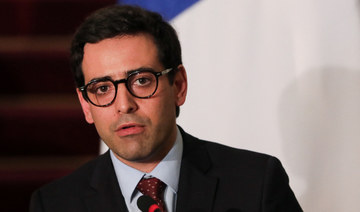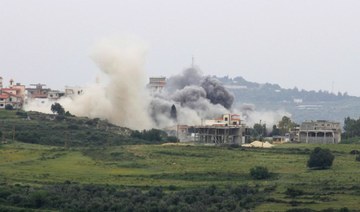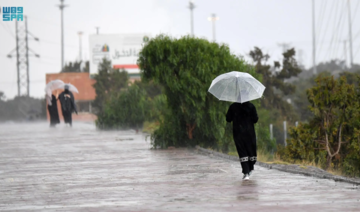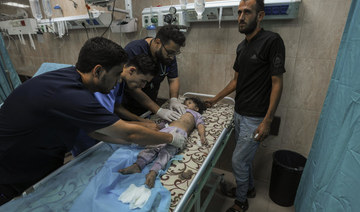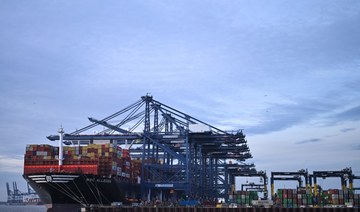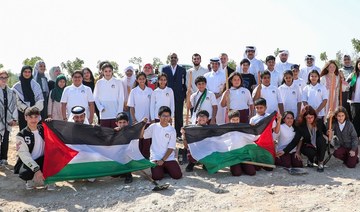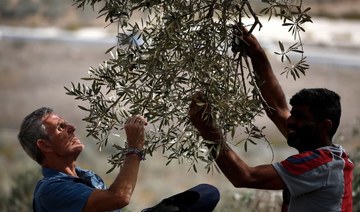VATICAN CITY: Pope Francis says his pilgrimage this week to the United Arab Emirates wrote a “new page in history of the dialogue between Christianity and Islam” and in promoting world peace based on brotherhood.
Telling pilgrims at the Vatican Wednesday about making the first-ever papal trip to the Arabian Peninsula, Francis described his encounter with leaders of Islam as a counterpoint to the “strong temptation” to contend there’s a current clash between Christian and Islamic civilizations.
While in Abu Dhabi, Francis signed a document with the grand imam of Al-Azhar, the ancient seat of learning in Sunni Islam, condemning religiously motivated and other violence. The pope said the two religious leaders wanted to give a “clear and decisive sign” that respect and dialogue is possible between the Christian and Islamic worlds.
Pope: My UAE trip wrote new page in Christian-Islam history
Pope: My UAE trip wrote new page in Christian-Islam history
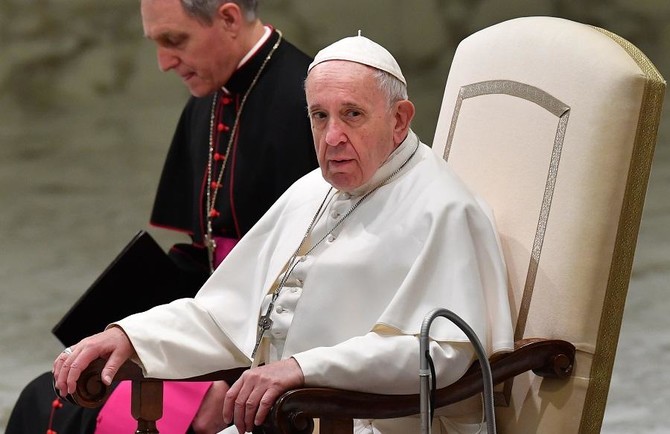
- Pope Francis visited the UAE on Feb. 3 to 5
- Francis described his encounter with leaders of Islam as a counterpoint to the “strong temptation” to contend there’s a current clash between Christian and Islamic civilizations
French FM in Beirut submits new peace proposal
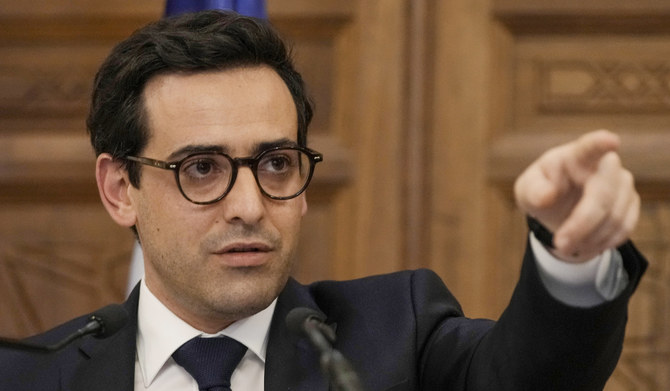
- ‘We are working to avoid Lebanon being ravaged by a regional war,’ says Stephane Sejourne
BEIRUT: The French foreign minister has submitted a new peace proposal in Beirut aimed at ending months of violence between Hezbollah and Israel.
Stephane Sejourne met officials in Beirut on Sunday, calling on the warring parties to abide by UN Resolution 1701.
After the talks, he said: “War exists even if not explicitly named. Civilians are paying the price, and no one is interested in the continuing escalation. This is the message I conveyed here, and this is the message I will convey on Tuesday to Israel.”
The minister discussed an amendment to a proposal Paris had presented to Lebanon for a diplomatic resolution to the conflict.
UN Resolution 1701, which brought an end to the brutal Israel-Hezbollah war in 2006, is widely viewed as the most suitable framework for ending the latest conflict.
However, Hezbollah has persisted with linking its strikes on Israel to events in the Gaza Strip, while the Lebanese state has reminded Israel of its obligation to Resolution 1701 following repeated violations.
On Monday, reports said that a French technical team would bring the revised French initiative to Lebanese authorities within 48 hours. Parliament Speaker Nabih Berri was notified by Sejourne about the update.
The proposal will be delivered to Lebanon through diplomatic channels, said the French minister, who left Lebanon on Sunday night following his visit.
The revised version of the French initiative contains several pillars, including the cessation of hostilities between Hezbollah and the Israeli army under UN Resolution 1701.
It also calls for the safe return of Israelis to northern settlements and Lebanese citizens to border towns in the south.
Additionally, the initiative calls for deploying more Lebanese military forces across border areas and strengthening the UN peacekeeping mission in Lebanon, UNIFIL.
The earlier version of the French peace plan, sent to Lebanon in mid-March, called for Hezbollah and its allies to retreat 10-12 km from the border. It also urged Israel to avoid “air violations.”
While in Beirut, Sejourne advised Berri to prioritize the election of a president before finalizing negotiations on the situation in the south.
Establishing a governing authority and ensuring presidential involvement in negotiations with Israel was “important,” he said.
Berri presented Sejourne with a map from the Scientific Research Institute that detailed the extensive damage and losses caused by Israeli military operations in southern Lebanon.
The map said that Israeli phosphorus bombings had affected “an area of 10 million sq meters.”
In addition, since the low-level conflict began last October, 1,000 housing units have been destroyed and thousands partially damaged.
Israeli operations have caused “significant harm to the environment and agriculture,” an infographic said.
After his talks in Lebanon, the French foreign minister said: “The crisis has lasted a long time. We are working to avoid Lebanon being ravaged by a regional war.
“We call on all parties to exercise restraint, and we reject the worst scenario in Lebanon, which is war.”
The UNIFIL operational region in Lebanon saw no activity on Sunday morning, after months of hostilies between Hezbollah and Israel in the area.
It coincided with Sejourne’s visit to UNIFIL headquarters in Naqoura, where he was briefed on the border situation by commander Gen. Aroldo Lazaro.
Sejourne also inspected the work of French peacekeepers serving with UNIFIL.
Meanwhile, Israeli military drones launched two missiles toward Aita Al-Shaab on Monday.
Other Israeli military drones raided Khiam, following a night of heavy shelling on Lebanese border villages, including Aita Al-Shaab, Kfarkila, Tayr Harfa, Naqoura and Jabal Blat.
Hezbollah said it targeted “a gathering of Israeli soldiers in the vicinity of the Ruwaizat Al-Alam site with artillery shells.”
Residents in southern Lebanon have claimed that the Israeli army is deploying “a new type of heavy artillery.”
One resident told Arab News: “The whole region shakes and the ground trembles under our feet from the border until Nabatieh as if they were using seismic, thermobaric missiles.”
The morning Israeli strikes were a response to the interception of “over 30 missiles launched from southern Lebanon toward the Galilee panhandle and the upper Galilee,” according to Israeli media.
The Al-Qassam Brigades — the military wing of Hamas — said in a statement that its Lebanon branch had targeted the headquarters of Israel’s 769th Eastern Brigade.
The group launched a salvo of rockets from southern Lebanon, describing the attack as a response to “Israel’s massacres in Gaza and the West Bank.”
Suspected Houthi missiles hit commercial ship in Red Sea
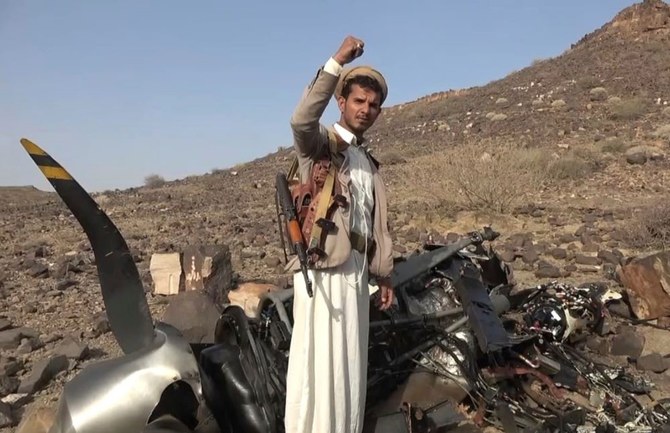
- US military destroys new barrage of militia drones
- CENTCOM says actions taken to protect freedom of navigation and make international waters safer
AL-MUKALLA: Missiles thought to have been fired by Houthi forces in Yemen targeted a commercial ship in the Red Sea on Monday as the US military destroyed a new barrage of Houthi drones.
UK Maritime Trade Operations said that it received an alarm about an explosion in the proximity of a commercial ship 87 km northwest of Yemen’s western town of Al-Mokha, but that the ship and the crew were safe.
“Vessels are advised to transit with caution and report any suspicious activity to (us),” UKMTO said on X.
Ambrey, a UK maritime security service, identified the target ship as a Malta-flagged cargo vessel that was hit by three missiles while travelling from Djibouti to the Gulf.
The Houthis did not immediately claim responsibility for Monday’s strike, although they often only take credit several hours, sometimes even days, after an attack.
Since November, the Iran-backed Houthis have seized one commercial ship, sunk another, and launched hundreds of drones, ballistic missiles, and remotely operated and explosives-laden boats at commercial and navy vessels in the Gulf of Aden, the Red Sea, and the Bab Al-Mandab Strait.
The Yemeni militia claims that the assaults are aimed only against Israel-bound and Israel-linked ships to push Israel to allow humanitarian supplies into the Gaza Strip.
In response to the Houthi’s ship campaign, the US formed a coalition of marine forces to protect critical maritime channels off Yemen and began strikes on Houthi-controlled areas of Yemen.
The US Central Command said that its forces on Sunday intercepted five drones launched by the Houthis over the Red Sea that were aimed at the US, its allies, and international commercial and naval ships.
“These actions are taken to protect freedom of navigation and make international waters safer and more secure for US coalition and merchant vessels,” CENTCOM said on X on Monday morning.
At the same time, the Houthi-run Saba news agency reported that the group’s armed forces carried out more than 83 strikes on 103 ships affiliated with Israel and its allies, as well as shooting down three US military MQ-9 Reaper drones between November 19, 2023, and April 26, 2024.
In a 39-page report on campaign against shipping in the Red Sea, the Houthis claimed that their strikes killed two American marines, two Filipinos, and one Vietnamese sailor while injuring four marines from the US-led marine task force.
During the campaign, the Houthis captured one ship, set fire to four, sunk two others, and damaged scores more, according to the report.
Despite a recent escalation in the number of strikes, since late last month the Houthis have drastically curtailed missile and drone attacks on ships.
The decrease in assaults has caused US military generals and analysts to surmise that the Houthis may have run out of weaponry and that the US-led air campaign reduced their military capabilities.
Jordan welcomes UK delegation to introduce weather forecasting project
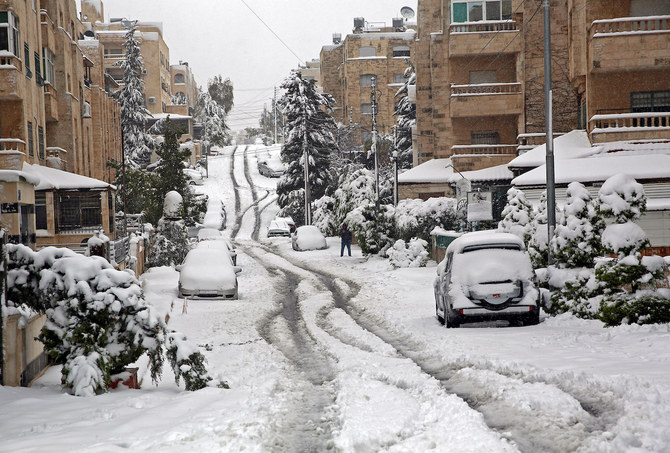
- Project aims to provide meteorological data and early warnings to refugee-hosting communities
AMMAN: Jordanian Transport Minister Wesam Altahtamouni welcomed a delegation from the British Embassy in Amman and the British Meteorological Office on Monday.
The meeting came as part of the UK Foreign Ministry’s efforts to implement the Jahez project, which aims to provide meteorological data and early warnings to refugee-hosting communities, Jordan News Agency reported.
Jahez, which will span three to five years, aims to develop proactive plans and long-term strategies, enhance monitoring and forecasting systems, and implement resilience-building measures to mitigate the effects of climate change.
The collaboration will involve Jordan’s ministries of transport, environment, planning, water and irrigation, as well as relevant municipalities.
Helen Ticehurst from the British Meteorological Office explained the British Meteorological Office’s operations and the objectives of Jahez.
The project also focuses on climate finance for countries hosting refugees.
Altahtamouni praised the British delegation for its willingness to provide technical assistance, leveraging the expertise of the British Meteorological Office in proactive weather forecasting and climate change adaptation.
Djibouti FM to stand at African Union Commission elections
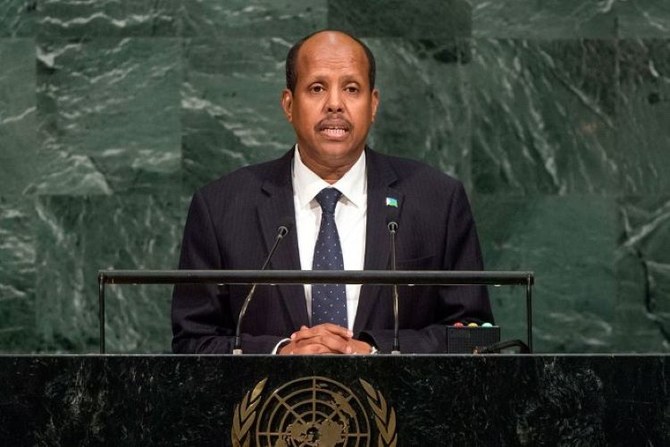
- Mahamoud Ali Youssouf calls for resolution of conflicts in Sudan, Gulf of Aden and Gaza
- Mahamoud Ali Youssouf: The only thing we know for sure today is that the next president will come from an East African country
RIYADH: Mahamoud Ali Youssouf, the minister of foreign affairs and international cooperation of the Republic of Djibouti, intends to stand for election to the African Union Commission.
The commission is based in Addis Ababa, Ethiopia. Its main functions are to represent the AU and defend its interests under the authority and mandate of the assembly and executive council.
The minister said that the main objectives of the commission are to promote integration, economic and social development, peace, security and human rights on the continent. It also aims to strengthen continental and international cooperation.
Tradition dictates that the president of the commission should be elected for a renewable four-year term, and should obviously be African, especially as the next session will be chaired by the East African Community, which includes Djibouti among its members.
The diplomat believes that winning these elections will contribute greatly to strengthening integration between the countries of the continent, as well as to reinforcing African relations with various other geographical groups, given the international and regional acceptance and respect enjoyed by Djibouti thanks to its balanced foreign policy.
Youssouf said he had been encouraged to stand as a candidate in the forthcoming elections by the respect and diplomatic appreciation that Djibouti possesses, highlighting also his long personal experience in the diplomatic field as an ambassador and then as minister of foreign affairs and international cooperation since 2005, and his in-depth knowledge of the work of the AU.
He said that a good knowledge of continental affairs is essential to occupy such an important position, adding that such an organization needs experienced leaders and diplomats to effectively promote continental and international cooperation given the continent’s current circumstances.
“The only thing we know for sure today is that the next president will come from an East African country. It will then be up to the member states to decide on the day of the vote,” he said.
Youssouf said that if elected, he will focus, in the interests of the African people, on three important areas: strengthening cooperation and economic integration between the countries of the continent; developing continental and international cooperation; and cooperation with international and regional organizations such as the UN, the Organization of Islamic Cooperation and the Arab League.
In early January, the Somaliland region signed an agreement with Ethiopia granting it a maritime opening to the Gulf of Aden. This treaty led to a political crisis between Ethiopia and neighboring Somalia, which promptly cancelled the memorandum, calling it illegal.
Youssouf said Djibouti currently chairs the Intergovernmental Authority on Development, and that Somalia and Ethiopia are members, along with other countries in the region, which gives it an additional responsibility in mediating between the two. He said that settlement efforts are continuing with Djibouti and Kenya mediating, with hopes that the two parties will reach an agreement soon.
He added that Djibouti, through its current presidency of IGAD, is very interested in seeing diplomatic relations between Somalia and Ethiopia return to what they were before the signing of the MoU.
Youssouf maintains that other crises in the world have distracted attention from Africa’s bloodiest conflict in Sudan, calling it the most forgotten crisis, especially when it comes to refugees and population displacement. He said that over 6.5 million Sudanese have been forced to leave their homes, with over a third of them displaced outside the country, and that the proliferation of ethnically-based militias in the current conflict is equally alarming.
As Sudan is a founding member of IGAD, he said Djibouti is making intense and continuous efforts in coordination with the other member states and the international community, notably the US and Saudi Arabia, to find a solution to the ongoing conflict in this brotherly country.
He also revealed that his country had already received representatives of the parties responsible for the crisis in Sudan to listen to their points of view and their vision for a solution. It should be noted that all have affirmed their desire to put an end to the war, and hope that these efforts will lead to a permanent and unconditional ceasefire, Youssouf said.
Recently, attacks on ships in the Red Sea have intensified, targeting vessels and disrupting this most important maritime passage. Youssouf said Djibouti is following these developments with great concern, specifying that the Bab Al-Mandeb Strait, overlooked by Djibouti, is considered an international passage of extreme importance from a political and economic point of view.
He confirmed that any breach of security in this area has global repercussions, given its role as a vital artery for international trade, and called for solutions to be found to the various crises in the region, so that everyone can enjoy peace and security.
With regard to the war on Gaza, Youssouf urged the international community to assume its responsibilities and put an end to the Israeli campaign which has cost the lives of over 34,000 people, as well as the resulting displacement and famine threatening the lives of millions of children.
Jordan nominates ancient Mehras olive trees for UNESCO Intangible Cultural Heritage list
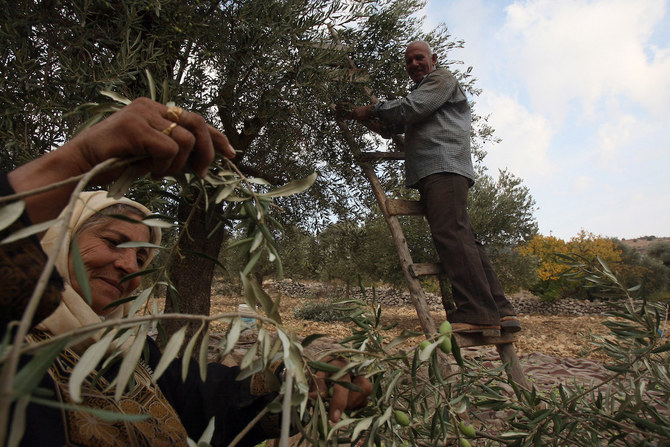
- Culture minister underscored the profound importance of the olive tree in Jordanian society
AMMAN: Jordan has nominated its Mehras olive trees for inclusion on UNESCO’s representative list of Intangible Cultural Heritage for the year 2025, Jordan News Agency reported on Monday.
According to the Food and Agricultural Organization, Jordan has some of the world’s most ancient habitats for olive trees.
Olive trees cover approximately 30 percent of all cultivated land in Jordan, constituting 75 percent of fruit trees. The olive trees hold immense significance for Jordan’s economy, environment, and culture.
Jordanian Culture Minister Haifa Najjar highlighted the importance of the tree to Jordanian heritage, drawing attention to its regional and international significance.
The minister underscored the profound importance of the olive tree in Jordanian society, representing both agricultural prowess and the cultural heritage deeply ingrained in the lives of its people.
She commended the collaborative efforts between the Ministry of Culture and national stakeholders in finalizing the nomination dossier for “The Ancient Olive Tree — Al-Mehras” to be presented to UNESCO in Paris.
Najjar noted the ministry’s commitment to documenting and safeguarding elements of intangible cultural heritage and the positive effect of such nominations on Jordan’s cultural presence globally.
The ministry previously secured UNESCO recognition for Jordanian cultural elements such as As-Samer traditional dance and mansaf, a traditional dish.
The ministry has participated in joint Arab nominations to UNESCO, highlighting the interconnectedness of cultural practices across the region. Previous submissions included files on date palm cultivation and Arabic calligraphy.
Looking ahead, Najjar mentioned joint Arab nominations currently under consideration for the 2025 UNESCO list. These encompass an array of practices and traditions, including mud architecture, traditional attire for men, musical instruments such as the oud, and various crafts and skills associated with Arab cultural heritage.


